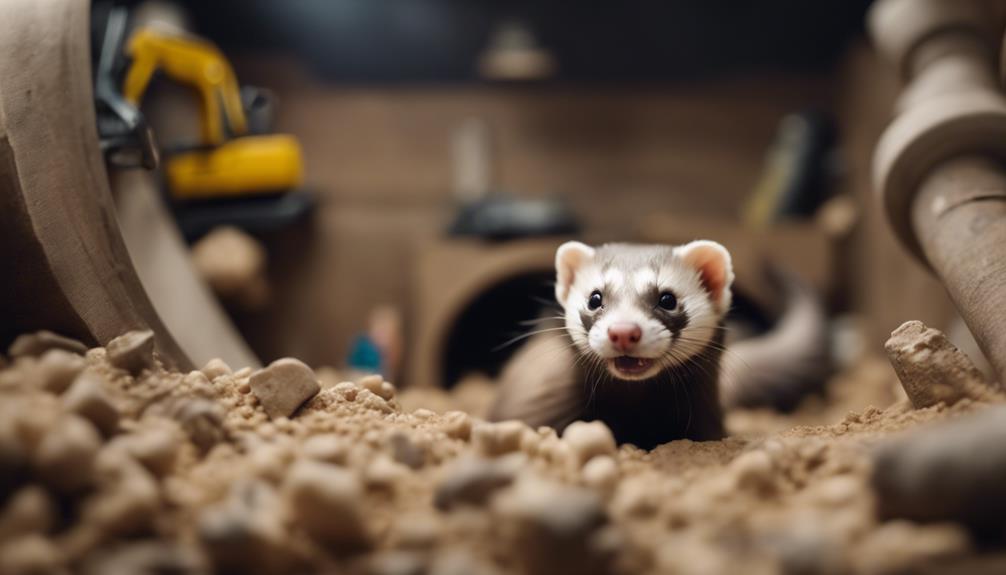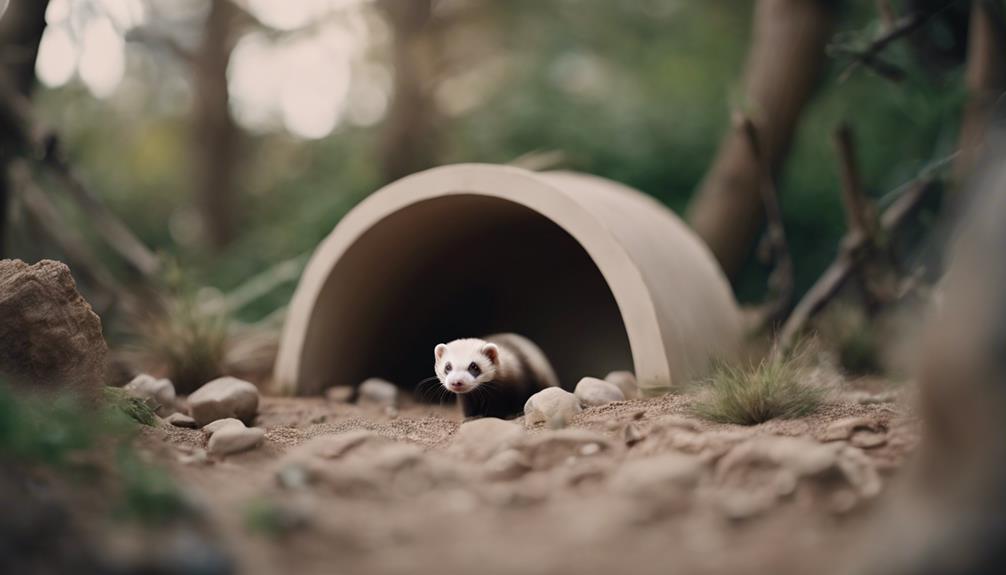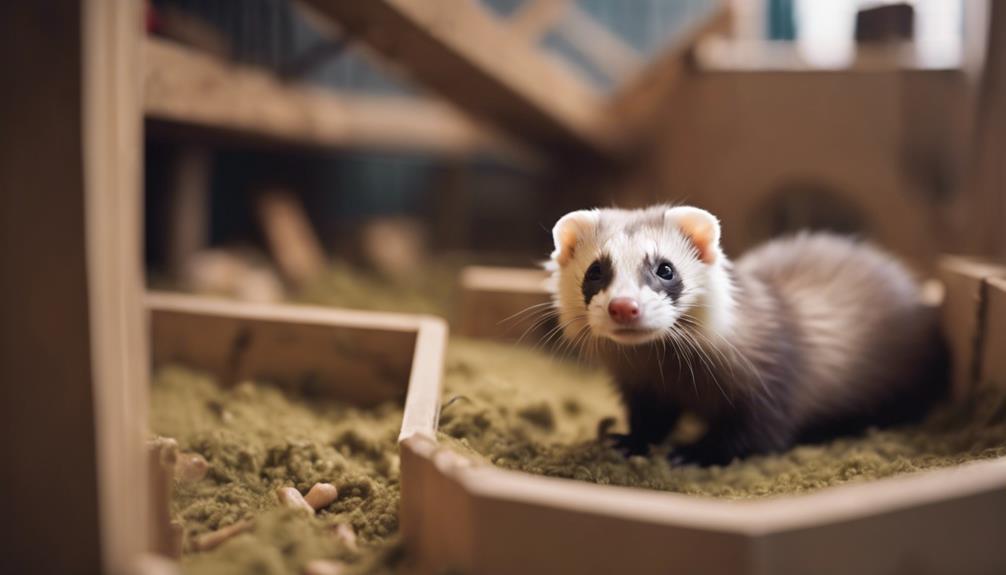Why Space to Dig and Tunnel Is Important in Ferret Habitats

Importance of Space for Digging and Tunneling in Ferret Habitats:
Benefits include:
- promoting natural behaviors,
- enhancing well-being, and
- fostering harmonious coexistence between ferrets and their owners.
Physical Exercise Benefits
Physical exercise in ferrets is crucial for maintaining their overall health and well-being. Outdoor play provides ferrets with the opportunity to engage in natural behaviors such as running, climbing, and exploring their surroundings. This type of exercise helps to keep ferrets physically fit, preventing obesity and promoting cardiovascular health. Additionally, outdoor play allows ferrets to soak up the sunlight, which is essential for their vitamin D production and overall well-being.
When outdoor play isn't possible, indoor activities can still offer valuable exercise opportunities for ferrets. Providing toys such as tunnels, balls, and climbing structures can stimulate their natural instincts to explore and play. Interactive playtime with their human caregivers is also beneficial for keeping ferrets active and engaged. Regular exercise not only contributes to the physical health of ferrets but also helps to prevent behavioral issues that may arise from boredom or lack of stimulation. By incorporating both outdoor play and indoor activities into their routine, ferret owners can ensure that their pets remain happy, healthy, and well-exercised.
Mental Stimulation Importance

Mental stimulation plays a vital role in maintaining the cognitive health and overall well-being of ferrets. Providing opportunities for mental enrichment is crucial to meet their behavioral needs and ensure they lead fulfilling lives. Here are four important aspects to consider:
- Enriching activities: Engage ferrets in activities that challenge their minds, such as puzzle toys, interactive games, or hiding treats for them to find. These activities not only provide mental stimulation but also prevent boredom and encourage problem-solving skills.
- Social interaction: Ferrets are social animals that thrive on interaction with their human caregivers and other ferrets. Regular playtime and socialization help meet their need for mental stimulation and prevent loneliness.
- Novel environments: Introducing new objects, scents, or rearranging their habitat can spark curiosity and mental engagement. Ferrets are naturally curious creatures, and novel experiences can keep them mentally active.
- Training sessions: Training sessions not only strengthen the bond between ferrets and their owners but also provide mental stimulation through learning new behaviors and tricks. Training sessions tap into their intelligence and keep their minds sharp.
Instinctual Behavior Mimicking

Ferrets instinctually mimic behaviors they observe in their environment to adapt and communicate within their social group. This behavior is crucial in understanding how they interact with their surroundings. For instance, natural burrowing is an inherent behavior in ferrets. Observing other ferrets or animals digging burrows prompts them to engage in similar activities. This not only serves as a way to adapt to their environment but also aids in building a sense of community within their group. Playful behavior is another aspect where mimicry plays a significant role. When one ferret engages in playful antics, others often follow suit, creating a harmonious and engaging atmosphere.
| Instinctual Behavior Mimicking | Examples |
|---|---|
| Natural Burrowing | Observing others dig burrows |
| Playful Behavior | Mimicking playful antics of companions |
| Environmental Enrichment | Engaging in burrow building activities |
Understanding these behaviors and the importance of mimicry sheds light on the significance of providing adequate space for ferrets to engage in these activities freely.
Preventing Boredom and Aggression

Observing the behavioral patterns of ferrets can provide valuable insights into strategies for preventing boredom and aggression in their captive environments. Ferrets are highly intelligent and curious animals that require mental stimulation to thrive. To prevent stress and promote overall well-being, it's crucial to implement behavioral enrichment techniques in their habitats.
Here are some key strategies:
- Provide a variety of toys: Offering toys that encourage natural behaviors like digging, hiding, and hunting can keep ferrets engaged and mentally stimulated.
- Rotate toys regularly: Changing the toys available to ferrets on a regular basis prevents boredom and maintains their interest levels.
- Introduce interactive play: Engaging with ferrets through interactive play sessions can strengthen the bond between the animals and their caregivers while providing mental stimulation.
- Create obstacle courses: Setting up obstacle courses with tunnels, ramps, and platforms can challenge ferrets physically and mentally, preventing aggression and fostering a sense of exploration.
Health and Well-being Impact

In evaluating the impact of space on ferret habitats, researchers have consistently observed a direct correlation between living environment size and the overall health and well-being of these animals. Adequate space allows ferrets to engage in natural behaviors such as digging and tunneling, promoting physical exercise and mental stimulation. Moreover, space facilitates social interactions among ferrets, which are highly social animals, contributing to their emotional enrichment and overall happiness.
| Benefits of Space in Ferret Habitats | Observations |
|---|---|
| Physical exercise | Increased activity levels and agility in ferrets. |
| Mental stimulation | Reduced stress and boredom-related behaviors. |
| Social interactions | Enhanced bonding among ferrets, leading to improved well-being. |
Creating Enriching Environments

Ferrets exhibit a natural inclination for digging and tunneling behaviors. These actions serve multiple purposes, such as providing avenues for exploration and ensuring a sense of security.
Understanding and incorporating these behaviors into their environment can significantly enhance the well-being of ferrets.
Digging for Exploration
Within the natural behavior repertoire of ferrets, the act of digging plays a crucial role in fostering exploration and creating enriching environments within their habitats. Ferrets exhibit a strong drive to dig, which serves various purposes that contribute to their well-being and mental stimulation. When provided with the opportunity to engage in this behavior, ferrets embark on an exploration adventure that enhances their cognitive abilities and overall health.
The following points highlight the significance of digging for exploration:
- Physical Exercise: Digging allows ferrets to engage in physical activity, promoting muscle strength and coordination.
- Mental Stimulation: The process of digging stimulates the ferret's mind, preventing boredom and encouraging problem-solving skills.
- Territory Marking: Through digging, ferrets establish territories and create a sense of ownership within their environment.
- Sensory Stimulation: Digging exposes ferrets to different textures and scents, enriching their sensory experiences.
Tunneling for Security
Tunneling behavior in ferrets serves as a fundamental aspect of their natural instinctual behaviors, contributing significantly to their sense of security and environmental enrichment. Ferrets, by nature, seek out enclosed spaces to feel safe and secure, mimicking their instinct to burrow in the wild for protection against predators.
Providing tunnels in their habitat allows them to exhibit this behavior, reducing stress and promoting mental well-being. These tunnels offer a retreat for ferrets when they feel threatened or overwhelmed, serving as a sanctuary where they can relax and regroup.
Space Design Tips

To optimize a ferret's habitat, it's crucial to carefully consider the spatial design elements to ensure their well-being and enrichment. By utilizing the space effectively, ferrets can exhibit their natural behaviors and thrive in captivity. Here are some space design tips to create an ideal environment for your ferret:
- Multiple Levels: Incorporate platforms and ramps to maximize vertical space, allowing ferrets to climb and explore.
- Hidden Spaces: Provide hiding spots like tunnels or boxes for ferrets to retreat to when they seek privacy or security.
- Play Area: Designate an open area for play with toys and interactive elements to stimulate physical activity and mental engagement.
- Room to Run: Ensure ample floor space for running and romping around, promoting exercise and overall well-being.
Frequently Asked Questions
How Can Providing Space to Dig and Tunnel in a Ferret Habitat Benefit Their Physical Health and Overall Well-Being?
Providing space for digging and tunneling in a ferret habitat allows for natural behaviors, promoting physical exercise and mental stimulation. This enhances the ferret's overall well-being by reducing stress, preventing boredom, and encouraging healthy activity levels.
What Are Some Practical Ways to Create an Enriching Environment for Ferrets That Includes Opportunities for Digging and Tunneling?
In creating an enriching environment for ferrets, incorporating enrichment activities like DIY tunneling systems can provide mental stimulation and mimic natural behaviors. Giving them space to dig and tunnel boosts their well-being.
How Does Mimicking Instinctual Behaviors in Ferrets, Such as Digging and Tunneling, Contribute to Their Mental Stimulation and Happiness?
Mimicking instinctual behaviors in ferrets, such as digging and tunneling, enhances their mental stimulation and happiness. Enrichment activities that replicate natural behaviors provide mental engagement, fulfilling their needs and promoting a sense of contentment and well-being.
In What Ways Can a Lack of Space for Digging and Tunneling Lead to Boredom and Aggression in Ferrets, and How Can This Be Prevented?
A lack of space for digging and tunneling can lead to boredom and aggression in ferrets. Enrichment activities, such as providing tunnels and digging boxes, are crucial for preventing behavioral problems and managing aggression in these animals.
What Are Some Tips for Designing a Ferret Habitat That Maximizes Space for Digging and Tunneling While Ensuring the Health and Safety of the Animals?
In designing a ferret habitat that maximizes space for digging and tunneling, one should focus on providing enrichment activities that cater to their behavioral needs. Playtime and opportunities for burrow building are essential for their well-being.











